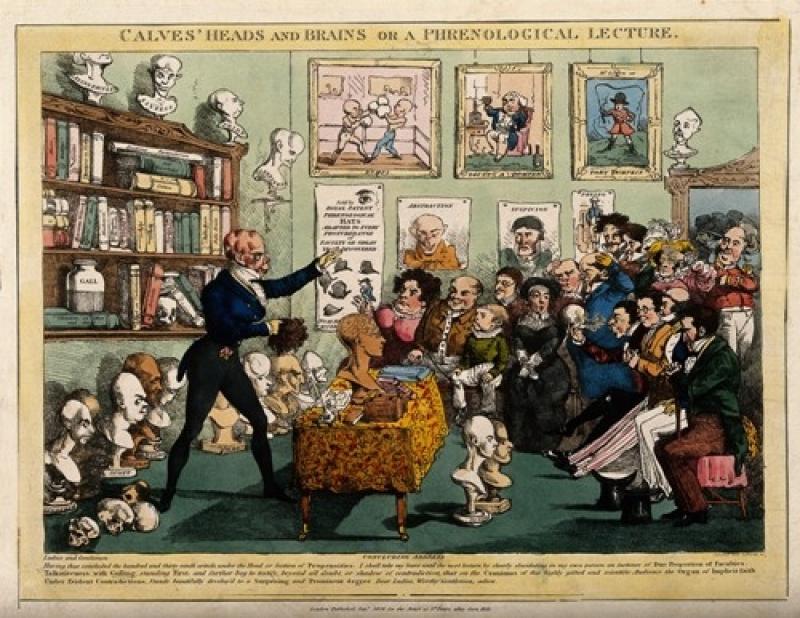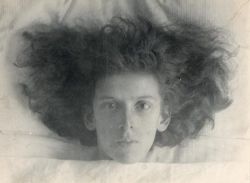Identity, The Wellcome Collection | reviews, news & interviews
Identity, The Wellcome Collection
Identity, The Wellcome Collection
Who do we think we are? Some scientific answers go on show

Perhaps we think we’ve got the whole thing more or less sewn up in the nurture versus nature debate. DNA profiling, gene studies, twin studies, inherited traits - this is the stuff we read about almost daily and it is all meant to tell us who we are. At any rate we seem to live in a culture obsessed with genealogy, which is perhaps as much to do with living as atomised units as it to do with the latest research about genes, or what used to be called heredity.
Or perhaps the fixation that has more to do with the television series which gets expert genealogists to look into the family tree of some celebrity chef. We can all be amateur genealogists now. The Wellcome Collection’s "Eight rooms, nine lives" exhibition is all about who we think we are. It mixes up art, biography, science and cultural history to ponder the slippery concept of identity. The one overarching conclusion it seems to come up with is thoroughly post-modern in flavour: that identities are indeed slippery and fluid constructs made up of any number of things.
 Being a big, thorny topic, instead of attempting to provide hard answers to hard questions, the exhibition invites us to ponder the lives of others. Eight wooden cabins have been constructed - flimsy-looking structures that are perhaps intended to reflect our own flimsily constructed selves - in which nine lives are played out. They range from Samuel Pepys, the first great diarist, who not only gave us a unique insight into the Restoration era but into his own habits and predilections, to Claude Cahun, the French lesbian artist (pictured above) who defined her gender as “neutral” and went about constructing several identities to work as a muse for her own art.
Being a big, thorny topic, instead of attempting to provide hard answers to hard questions, the exhibition invites us to ponder the lives of others. Eight wooden cabins have been constructed - flimsy-looking structures that are perhaps intended to reflect our own flimsily constructed selves - in which nine lives are played out. They range from Samuel Pepys, the first great diarist, who not only gave us a unique insight into the Restoration era but into his own habits and predilections, to Claude Cahun, the French lesbian artist (pictured above) who defined her gender as “neutral” and went about constructing several identities to work as a muse for her own art.
 We also encounter twins who were born three years apart thanks to embryo freezing, and a glamorous one-time Vogue model, April Ashley (her cancelled passport is pictured above), who was one of the first people to undergo a sex change operation to become a woman. Outmoded scientific concepts such as phrenology, the measuring of cranial bumps to determine character, are explored alongside DNA profiling. And there’s a profile of Francis Galton, Darwin’s polymath cousin who ceaselessly measured and categorised the world about him and was the father of eugenics and fingerprinting.
We also encounter twins who were born three years apart thanks to embryo freezing, and a glamorous one-time Vogue model, April Ashley (her cancelled passport is pictured above), who was one of the first people to undergo a sex change operation to become a woman. Outmoded scientific concepts such as phrenology, the measuring of cranial bumps to determine character, are explored alongside DNA profiling. And there’s a profile of Francis Galton, Darwin’s polymath cousin who ceaselessly measured and categorised the world about him and was the father of eugenics and fingerprinting.
How common is it to feel a wide disjunction between what we look like and how we feel? Mirrors are everywhere in this exhibition. There’s Garrick’s old backstage mirror, an antique mirror once owned by Freud, tall mirrors and fancy mirrors. And then there’s a so-called “true mirror“, which reflects your face the right way round and prompts the disturbing thought: “Is that really how others see me?” Most of us are apparently disconcerted by our true mirror reflections. I‘m certainly one of them.
This is a fun, informative exhibition, packed with curious facts and weird propositions. But the most memorable part of it is for me - ironically, since it focuses on the loss of memory - were the diary entries of Clive Wearing, a former professional musician and Radio 3 producer. Wearing lost his memory to a virus in 1985 and has been unable to store any new memories since. His memory span last little longer than 30 seconds and his short, repetitive diary entries read as if he has just regained consciousness with every new sentence. Crossing out each entry as he begins a new one, he records his thoughts thus: “8.31. Now I am really, completely awake/9.06. Now I am perfectly, overwhelmingly awake/9.34. Now I am actually, superlatively awake.”
The 17th-century philosopher John Locke held that memory was the key to personal identity. That may be too simplistic a notion for us today, but if memory isn’t the key to our identities the loss of it certainly leaves us feeling bereft of an anchor on which to shore ourselves.
Identity: 8 Rooms 9 Lives continues at the Wellcome Collection until 6 April 2010. Entry is free. For more information visit the Wellcome website.
The future of Arts Journalism
You can stop theartsdesk.com closing!
We urgently need financing to survive. Our fundraising drive has thus far raised £49,000 but we need to reach £100,000 or we will be forced to close. Please contribute here: https://gofund.me/c3f6033d
And if you can forward this information to anyone who might assist, we’d be grateful.

Subscribe to theartsdesk.com
Thank you for continuing to read our work on theartsdesk.com. For unlimited access to every article in its entirety, including our archive of more than 15,000 pieces, we're asking for £5 per month or £40 per year. We feel it's a very good deal, and hope you do too.
To take a subscription now simply click here.
And if you're looking for that extra gift for a friend or family member, why not treat them to a theartsdesk.com gift subscription?
more Visual arts
 'We are bowled over!' Thank you for your messages of love and support
Much-appreciated words of commendation from readers and the cultural community
'We are bowled over!' Thank you for your messages of love and support
Much-appreciated words of commendation from readers and the cultural community
 Folkestone Triennial 2025 - landscape, seascape, art lovers' escape
Locally rooted festival brings home many but not all global concerns
Folkestone Triennial 2025 - landscape, seascape, art lovers' escape
Locally rooted festival brings home many but not all global concerns
 Sir Brian Clarke (1953-2025) - a personal tribute
Remembering an artist with a gift for the transcendent
Sir Brian Clarke (1953-2025) - a personal tribute
Remembering an artist with a gift for the transcendent
 Emily Kam Kngwarray, Tate Modern review - glimpses of another world
Pictures that are an affirmation of belonging
Emily Kam Kngwarray, Tate Modern review - glimpses of another world
Pictures that are an affirmation of belonging
 Kiefer / Van Gogh, Royal Academy review - a pairing of opposites
Small scale intensity meets large scale melodrama
Kiefer / Van Gogh, Royal Academy review - a pairing of opposites
Small scale intensity meets large scale melodrama
 Jenny Saville: The Anatomy of Painting, National Portrait Gallery review - a protégé losing her way
A brilliant painter in search of a worthwhile subject
Jenny Saville: The Anatomy of Painting, National Portrait Gallery review - a protégé losing her way
A brilliant painter in search of a worthwhile subject
 Abstract Erotic, Courtauld Gallery review - sculpture that is sensuous, funny and subversive
Testing the boundaries of good taste, and winning
Abstract Erotic, Courtauld Gallery review - sculpture that is sensuous, funny and subversive
Testing the boundaries of good taste, and winning
 Edward Burra, Tate Britain review - watercolour made mainstream
Social satire with a nasty bite
Edward Burra, Tate Britain review - watercolour made mainstream
Social satire with a nasty bite
 Ithell Colquhoun, Tate Britain review - revelations of a weird and wonderful world
Emanations from the unconscious
Ithell Colquhoun, Tate Britain review - revelations of a weird and wonderful world
Emanations from the unconscious
 Rachel Jones: Gated Canyons, Dulwich Picture Gallery review - teeth with a real bite
Mouths have never looked so good
Rachel Jones: Gated Canyons, Dulwich Picture Gallery review - teeth with a real bite
Mouths have never looked so good
 Yoshitomo Nara, Hayward Gallery review - sickeningly cute kids
How to make millions out of kitsch
Yoshitomo Nara, Hayward Gallery review - sickeningly cute kids
How to make millions out of kitsch
 Hamad Butt: Apprehensions, Whitechapel Gallery review - cool, calm and potentially lethal
The YBA who didn’t have time to become a household name
Hamad Butt: Apprehensions, Whitechapel Gallery review - cool, calm and potentially lethal
The YBA who didn’t have time to become a household name

Add comment